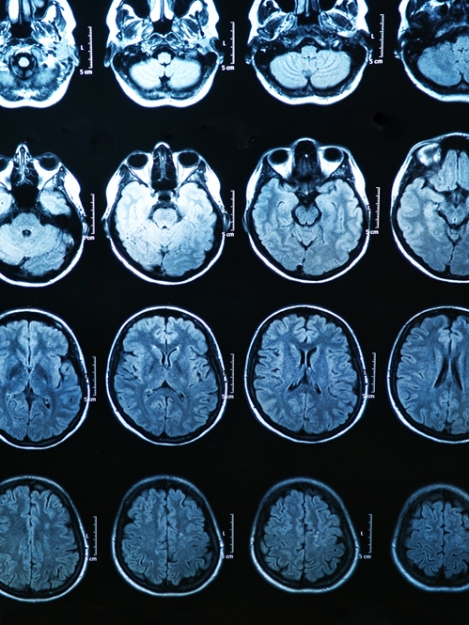Dr. Daniel Amen has dedicated his life to helping people take better care of their brains. As the medical director of Amen Clinics, he has compiled the world’s largest database of brain scans in an effort to find out how people can better care for, and even heal, their brains from trauma. Because of his work, dozens of former athletes who have suffered dementia, depression and other related symptoms, have sought his help to try to rehabilitate their brain trauma. In the following interview with AQ, Dr. Amen explains how his research has related to the troubles that athletes can face if they don’t take better care of their most precious possession.
What should an athlete consider to be Public Enemy #1 to the health of their brain?
Not thinking about your brain. Having no love or respect for it. I know it sounds crazy, but athletes do things with their head that are just crazy. When you think that your brain is involved in everything you do—how you think, how you act, how you manage your money, how you manage your relationships. When the brain works right, then people work right. When the brain is troubled, you are going to have trouble in your life. The brain is really soft, like the consistency of soft butter. And it’s housed in hard skull that has a lot of ridges. So if you lead with your head in football, that’s going to be really bad, because it doesn’t matter if you have a helmet on. You’re going to have a lot of rattling around in your skull, which causes brain damage—and then dementia, depression, marital problems, financial problems, all the things the brain manages.
So with all of the talk of changing equipment, you feel as if the activities are the same, the results will be the same?
Equipment changes will not make any difference. In fact, putting helmets into the game made it worse, because people thought now they couldn’t be hurt and they used their helmet as a weapon. I am not optimistic that football can be made a safe game. Now, that being said, I don’t think football is going away, so I think the NFL has to own it and start taking care of these players. I’m still working with a player who graduated with honors from a university. After playing several years in the NFL and suffering concussions, he had problems with depression and alcoholism. The league wanted nothing to do with him. When we scanned his brain, it was clear that he had significant brain damage. It really got under my skin.
Do you find more athletes coming to see you now that this topic has become more prevalent in the media?
Absolutely. I mean a lot of wonderful, sweet athletes that let me speak about them. Fred Dryer, the defensive end for the Rams when I was growing up has been great. Fred knew at the end of his career that this wasn’t good for him, and was trying to avoid it as much as possible at the end of his playing days. We just did a great project with Paul Kariya, a great hockey player who had headaches for twelve years. What athletes don’t realize is that if you focus on it, like you would rehab your knee or shoulder, you have to think about rehabbing your brain.
What would brain rehabilitation entail?
First, you have to focus on brain health. You need to sleep. You need to eat good food. If you’re overweight, you need to lose the weight, because it is toxic for brain function all by itself. As our players weight went up, their cognitive function went down in a linear fashion. It was fascinating. We put them on high-dose fish oil, a good multi-vitamin, a special supplement I designed with seven brain nutrients in it that you can get over the counter. For some players, we sent them for hyperbaric oxygen treatment if the damage was significant enough. And we did a treatment technique called nerve feedback, where we put electrodes on the skull and train the brain to respond more appropriately. And then, if they are depressed, we’ll try to get them a supplement or medicine for depression, we’ll have them see a therapist. It’s not hard or terribly expensive, but it’s very effective. We’ve had 30 NFL players who have shown significant improvement even after a few months on the program.
How does the hyperbaric chamber help brain health?
There’s something about oxygen under pressure that enhances healing. It’s not effective for everyone. I had one player who came to see me with dementia. Over the course of seven months, he lost 107 pounds, mostly because his wife got serious and managed his diet. He did hyperbaric oxygen. Usually dementia gets worst over time. His memory scores improved by 20%.
You mentioned obesity as being a huge detriment to brain health. There is so much pressure on the modern athlete to get bigger. Would you say that they are affecting their brain health by putting on additional weight?
That’s true. And we have to remember, professional athletes have been athletes for a long time. Some have had concussions in high school and college. They’ve been under chronic stress for a long time, and that’s very bad for the brain.
Concussions have been a big part of the news, but can brain trauma be more subtle than that?
No question. I knew a guy who played for the Pittsburgh Steelers. He told me one of the defensive lineman on the team had to head butt every other defensive lineman three times to start the practice. So if there were eight other linemen on the team, he would have to hit himself in the head 24 times before practice. That’s really stupid. The repetitive head slaps—these are not small people. These are big people with big muscles that can cause damage.
You brought up high school and college players before. Are we going to see an epidemic of these kinds of brain problems in the future?
We’re seeing it now. You’ve seen the Dave Duerson case. It’s horrifying. Right before he shoots himself, he texts his friend to say he’s donating his brain. That is horrifying to me. I think we had a pretty random sample that came to see us. The level of damage was frightening. It frightened me even though I was expecting to see it. There were 95% percent of guys that showed clear brain trauma. Now being in the NFL, they were likely to have played 7 or 8 years before the even got there. They were the biggest, strongest guys playing at the highest levels. There was a recent study that even high school players who had no concussions showed signs of cognitive impairment.
Was there anything in your research with athletes that surprised you?
The number of concussions did not matter to the damage. It’s like what Joe Louis said. It’s not the big hits that get you, it’s all the little hits.
In baseball and hockey, you’re starting to see players being held out for longer periods of time after concussions. That would seem to be in line with your thinking of brain rehab.
Yes, we believe if someone suffers a concussion, they should be out for a minimum of two months. If you blow out your knee, you’re not coming back that year. No disrespect to your knee, but it’s not your brain. You can take you leg off and still have a life. If you take your brain away, you and your family are going to begin to suffer. My friend, Dr. Bennet Omalu is the person who discovered quite a bit about CTE with the Mike Webster case. He recommends two months. When he said that at the player’s association meeting, everyone laughed.
If someone suffers an initial concussion, if they sit out two months, will they get back as close to normal as possible?
It’s hard to say, it depends on their pre-morbid state and it depends on their habits. Let’s take Paul Kariya for example. Paul had one of his first concussions in 1998. He had always been good about his diet. He meditated. Even with the brain injuries, he’s a very disciplined person. I had seen him 12 years later. If he had been obese and smoking and being bad to his brain, his recovery time would be much greater than if he had developed a brain healthy lifestyle.
How can athletes help their brains, even if they don’t engage in head-to-head contact?
One thing that’s super important for athletes will be coordination exercises. Many athletes are highly coordinated, but doing those types of exercises works a part of the brain called the cerebellum, which is connected to the judgment part of the brain. Dancing, table tennis, juggling, can actually be very helpful to an athlete’s overall performance.
Do you think the more we know about the brain that sports will change, or do you think it will be an ongoing problem?
I think it will definitely change. In fact, I’ve been awestruck by how fast it has changed. When I started our NFL study in January of 2009, I partnered with the Los Angeles chapter of the Retired Players Association. Don’t forget, the NFL has had a concussion committee since 1994, but they never did a brain image scan! When the NFL’s own study came out last year showing a nineteen-fold increase in dementia in young players last year, that’s when the NFL gave in. Now we see head injury posters in NFL locker rooms; we see fines for big hits. I think many mothers are saying to their 13, 14 and 15 year old sons that you can’t play. I mean, I played in high school and I loved playing football, but I know the answer for me is that kids should play tennis and table tennis.





